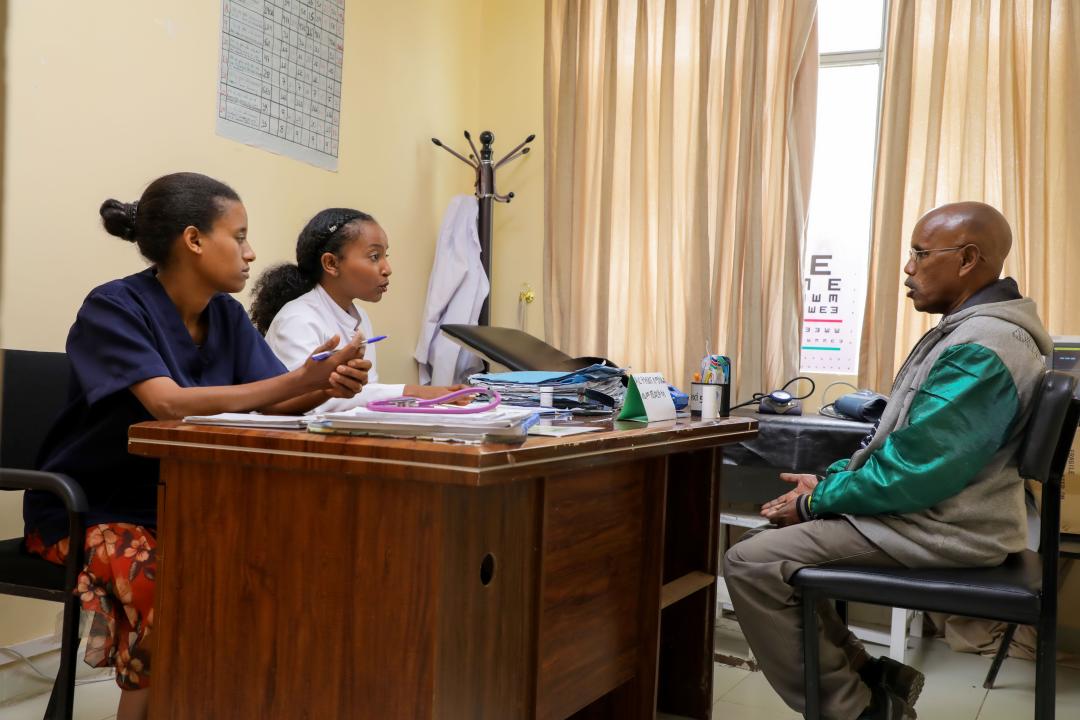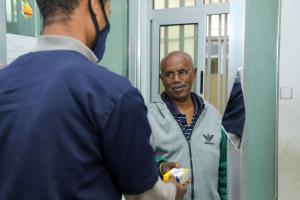Transforming chronic disease care
Addis Ababa ‒ Challenged by high cholesterol levels and hypertension, and later diabetes, 58-year-old Mola Admassie says his life has significantly changed thanks to the availability of noncommunicable disease services at the health centre 600 metres from his home.
Mola is frank that he is seldom in good health and recalls how arduous the lengthy commutes were when he had to visit Zewditu Memorial Hospital in the capital Addis Ababa, to undergo cardiac examinations, or receive care for elevated blood pressure or sugar levels.
“I had to leave my home at the crack of dawn because I did not have money to take a taxi,” Mola recalls.
“Whenever I feel that something may be wrong, it is so easy for me to go to the health centre and get the help I need.” Mola Admassie
For the past few months, due to a collaboration between the government and World Health Organization (WHO) to address Ethiopia’s growing chronic disease burden, he has instead been able to access the support he needs at the nearby Gerji Health Centre in Addis Ababa.
Chronic diseases, including mental health concerns and injuries, are becoming the leading cause of death and disability in Ethiopia due to lifestyle changes.
With support from WHO and other partners, the Government of Ethiopia is implementing a system of decentralizing noncommunicable disease care from hospitals to local health centres, called task-shifting. This eases the burden on busy hospitals and gives people more accessible and better-quality health care at local levels.
With support from WHO and other partners, the Government of Ethiopia has implemented task-shifting in 350 health facilities. With funding from the Norwegian Agency for Development Cooperation (Norad), WHO has directly supported task-shifting in 87 of these health facilities in eight regions. WHO has also supported the training of 2309 health professionals, including 180 pharmacists.
“We believe that our patients are happy.” Dr Timbilina Zewgemichael, Gerji Health Centre.
Primary health care professionals, including pharmacists, are key players in the initiative, providing screening, care and treatment for noncommunicable diseases at clinics within walking distance of people’s homes. As per WHO recommended protocols of team-based care, pharmacy professionals are an integral member of the health workforce for key services such as counselling, monitoring people on treatment and ensuring that they stay the course.
The engagement of pharmacy professionals in chronic diseases care is paramount, according to Dr Asmamaw Bezabeh, WHO Ethiopia’s Noncommunicable Diseases Programme Coordinator. “Because health facility pharmacy professionals are responsible for the selection, quantification and procurement of medicines, the objective of the training they receive is to upskill them about protocol-recommended medicines to ensure sustainable access,” he explains.
WHO protocols and guidelines, which are easy for health workers to use, ensure the provision of standardized services. For people accessing the services, they also know what to expect at every visit.

To help initiate services, WHO also provided equipment and supplies, including blood pressure measuring devices, glucometers with test strips and adult weighing machines, among other items. The Organization has also supplied acetic acid for visual inspection of the cervix, which is an an effective and inexpensive cervical cancer screening test that can be combined with simple treatment procedures for early cervical lesions.
“We have intervened by decentralizing services at hospital and health centre level, and have capacitated health care workers with different trainings, as well as equipped health facilities with drugs and diagnostic materials,” says Addisu Worku Tesema, Noncommunicable Diseases and Mental Health Team Lead at Ethiopia’s Ministry of Health. “One of our priority areas is health promotion, especially on physical activity and other risk factors for noncommunicable diseases.”
Mola says his prayers have been answered. “Whenever I feel that something may be wrong, it is so easy for me to go to the nearby health centre and get the help I need. My life is much easier now.”
Communication officer
WHO Ethiopia
Email: yfita [at] who.int (yfita[at]who[dot]int)
Media Relations Officer
WHO Regional Office for Africa
Email: dalalm [at] who.int (dalalm[at]who[dot]int)
Tel: +254 703 245 761 (WhatsApp)
